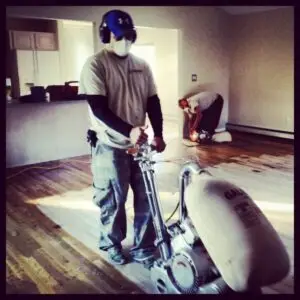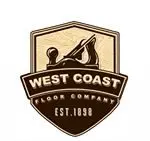Factory-Finished vs Unfinished Wood Floors – Which way to go
Customers often ask which is better factory-finished vs unfinished wood floors. And we tell that they both have their advantages and disadvantages! In our view, there is no comparison to the warmth and depths of unfinished hardwood that has been sanded and finished on-site. On-site finishing of the raw wood really brings out the grain and beauty of the wood. On the other hand, installing prefinished flooring is a much faster process and you can use the floor right after installation is complete. Plus, you’ll have a pretty good idea of what the finished floor will look like. Keep in mind that you’ll see, live with the floor you selected, and appreciate every day, for a very long time. Therefore, the extra days required for on-site finishing are of minor inconvenience when compared with the many years that you will enjoy your new hardwood floors! You should look upon your new hardwood floor as an investment into your property that will return a good ROI like no other floor will.
What are the main differences between factory-finished and unfinished floors?
Factory-finished hardwood planks have been sanded, stained, and coated with polyurethane at the factory. The boards are then oven-baked with aluminum oxide to create an extremely hard acrylic finish. Because each board is finished individually, the boards will have a beveled edge on both sides. All one needs to do is the installation (cut and nail the planks to the subfloor) and the floor is done. Due to the micro-bevel or groove in between each board, the floor is not totally flat, and each board will have a visible line in between the planks. Whereas unfinished flooring is raw wood that has no beveled edges. Unfinished flooring is raw hardwood that must first be installed, then sanded, and finally top coated on site. When unfinished hardwood flooring is sanded and finished on-site, there are no lines in between the boards, and you’ll end up with a perfectly flat, smooth floor.
Advantages of unfinished wood floors:
- Appearance: Unfinished hardwood planks look like real wood. Even though factory-finished flooring is real hardwood, the many factory sprayed-on coats of polyurethane and/or stain make the planks look plastic-y and factory-made ~ in our opinion. They tend to show less noticeable grain patterns and thus less warmth. There is nothing that compares to the natural warmth and beauty of a hardwood floor that has been sanded and treated by a real craftsman. Again, this is our opinion, and everyone has their own preferences. We don’t care for the beveled edge and resulting lines in the floor that you get with prefinished flooring, but some people do like them!
- Finish options: The creative possibilities with unfinished floors are nearly unlimited. The sky is the limit! You can choose from the countless different species of wood, innumerable stain colors, and many different finish options. You can also select other creative effects, which you cannot find in prefinished flooring. We can create a black and white floor, a green floor, or do a French Bleed, wire brushed, or hand scraped floor to your liking! Prefinished floors have a much narrower scope of wood species, colors, and finish options to choose from.
- Easier to keep clean: The beveled edges of a prefinished floor also create a trap for additional dirt, dust, and grime which can be more difficult to clean than a floor that has been finished on-site and is totally flat.
- Uniform stain color: Factory-finished flooring that is stained a dark color will only be stained on the face of the board. This means that because of the beveled edge you will be able to see the underside or lighter portion of the wood along the edges when you look at the floor from a distance. When unfinished hardwood is installed and finished on-site, the wood is smooth and uniform and the stain is applied to all visible areas.
Advantages to factory-finished floors:
- Time: Installing a prefinished floor is a much faster process. Once factory-finished flooring is installed, you can walk on it and put furniture on it immediately. Whereas with an unfinished hardwood floor, you can expect additional time for the sanding process, and then you will have to wait for another few days for the topcoat to cure before you can put furniture back on the floor.
- Less mess: Prefinished flooring is less messy since there is no sanding required. Sanding does create dust during the actual sanding process, though our dustless system definitely cuts down on the mess.
- No smell: With prefinished flooring, there are no chemical smells because there are no chemicals being applied on-site. The planks have already treated in the factory. Most people find that the smell from applying an oil-based polyurethane is rather intense, and not healthy to inhale. The good news is, the new green products that we recommend and use, have no harsh smells. If the customer insists on oil-based polyurethane, we usually recommend that they be out of the house during application and some time thereafter. For most residential properties, we tend to use Bona water-based polyurethanes which have very low VOCs, are environmentally friendly, and have almost no smell. We also recommend and frequently use Rubio and WOCA hard wax oils, which have no VOCs and no smell.
- Cost: Factory-finished flooring typically costs a bit less overall than unfinished flooring. Though prefinished flooring may cost more for the actual material, but save on installation costs resulting in a lesser overall cost.
Matching existing flooring in the home:
If you already have hardwood flooring in your home that you want to match, adding unfinished wood flooring is the way to go. You will be able to exactly match the species of wood, and an expert hardwood floor refinisher can custom match the stain color on the unfinished wood to mirror the existing floor.
Repairs:
If a hardwood floor that has been finished on-site gets scratched, it can be repaired on the spot by taping off boards and sanding those individual boards down to raw wood, and then refinishing them. The new hard wax oil finishes Rubio Monocoat and WOCA that we are using more and more frequently in residential homes are even easier to use for repairs as all they require is applying/rubbing in a bit of extra product to visible scratches. This makes it very easy for homeowners to do spot repairs themselves as scratches appear. If prefinished flooring becomes scratched, a whole section of the floor will need to be replaced, or the entire floor may need to be sanded in order to correct the problem.
Refinishing:
 Due to normal wear and tear, both prefinished and unfinished flooring will get some surface scratches over time. That is unavoidable. Unfinished flooring that has been treated with a water-based or an oil-based polyurethane can be buffed and re-coated every few years to revitalize the topcoat and remove surface scratches. If a hardwood floor is well-maintained and this process is done every 3 years, homeowners will never need a complete sanding! This buff and coat refinish is not an option for prefinished flooring. Prefinished flooring can be sanded down to raw wood, but due to the high number of polyurethane coats applied in the factory, the wood must be sanded down deeper into the material than a hardwood floor that was sanded and treated on site. This means that a prefinished floor cannot be sanded as many times as an unfinished floor as it will more quickly become too thin to re-sand. And with prefinished flooring, the beveled edge will be decreased with each sanding, but it will never go away completely!
Due to normal wear and tear, both prefinished and unfinished flooring will get some surface scratches over time. That is unavoidable. Unfinished flooring that has been treated with a water-based or an oil-based polyurethane can be buffed and re-coated every few years to revitalize the topcoat and remove surface scratches. If a hardwood floor is well-maintained and this process is done every 3 years, homeowners will never need a complete sanding! This buff and coat refinish is not an option for prefinished flooring. Prefinished flooring can be sanded down to raw wood, but due to the high number of polyurethane coats applied in the factory, the wood must be sanded down deeper into the material than a hardwood floor that was sanded and treated on site. This means that a prefinished floor cannot be sanded as many times as an unfinished floor as it will more quickly become too thin to re-sand. And with prefinished flooring, the beveled edge will be decreased with each sanding, but it will never go away completely!
Now that you got all of the details of factory-finished vs unfinished wood floors we should tell you that West Coast Floor Company in Napa can install and refinish both factory-finished and unfinished wood flooring. It’s up to the homeowner to decide which option works best for them! I’ve laid out what I feel are the benefits of factory-finished vs unfinished wood flooring, so hopefully, this post will be helpful if you need to make a decision! And as always, feel free to call us for some advice!
